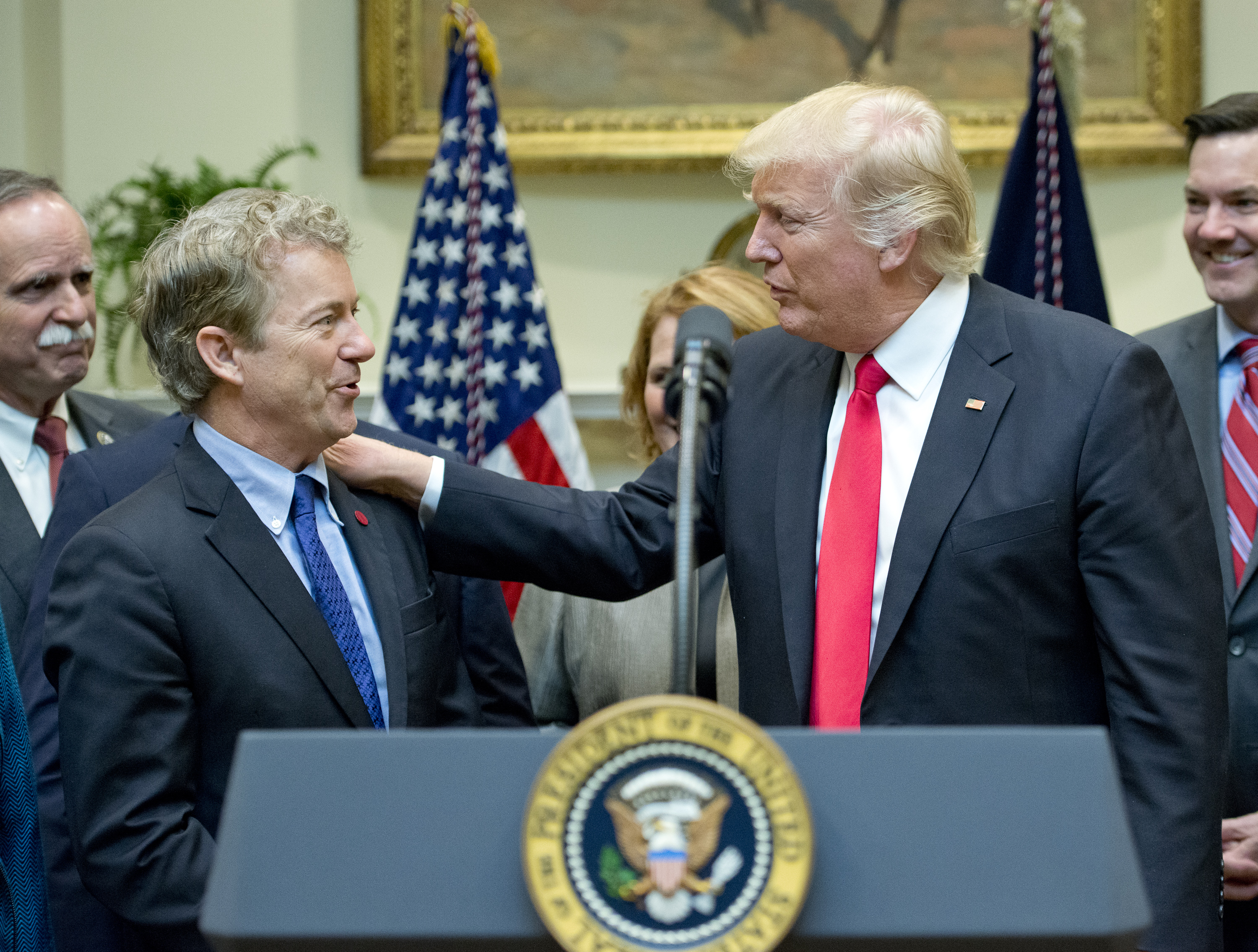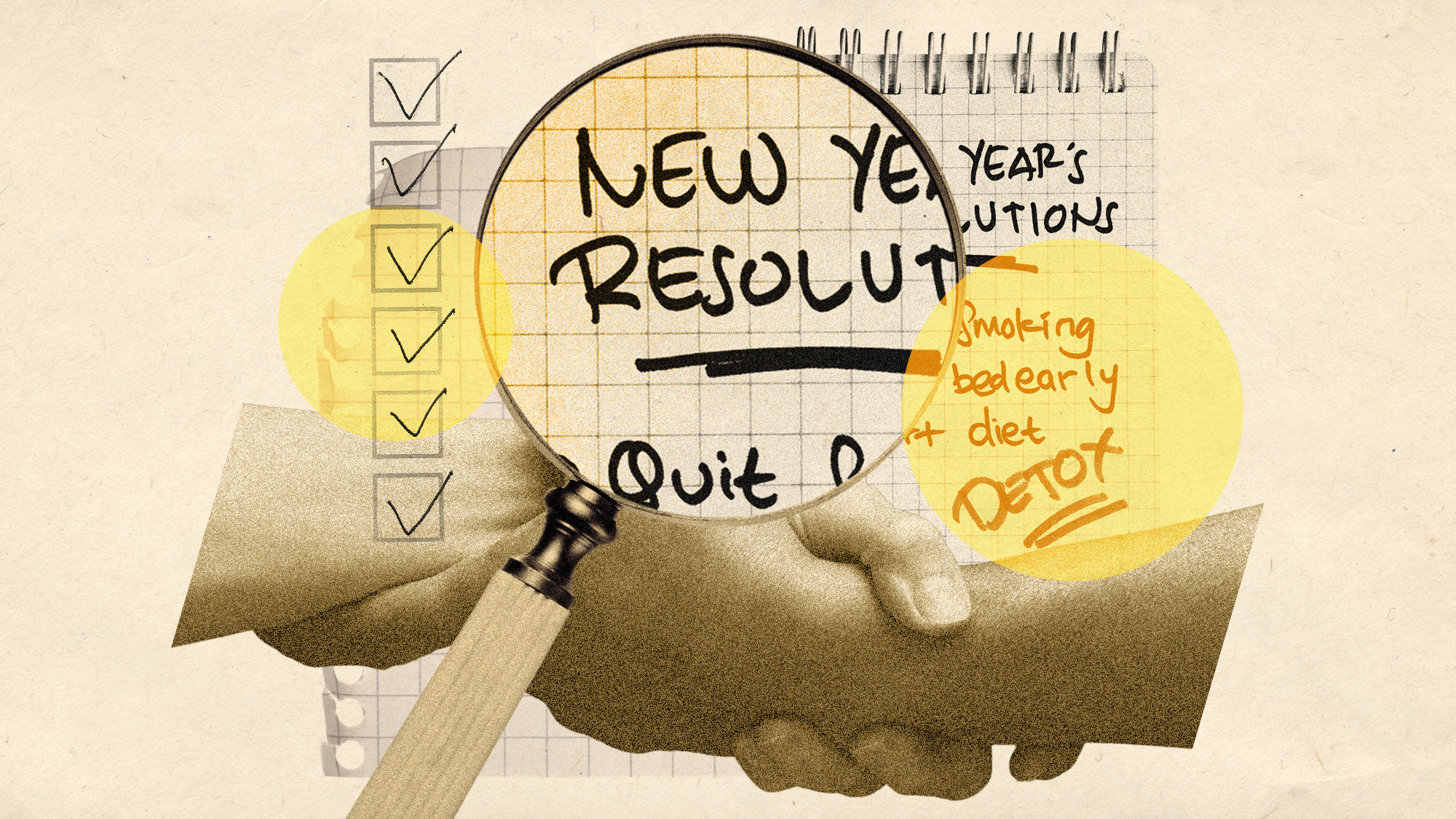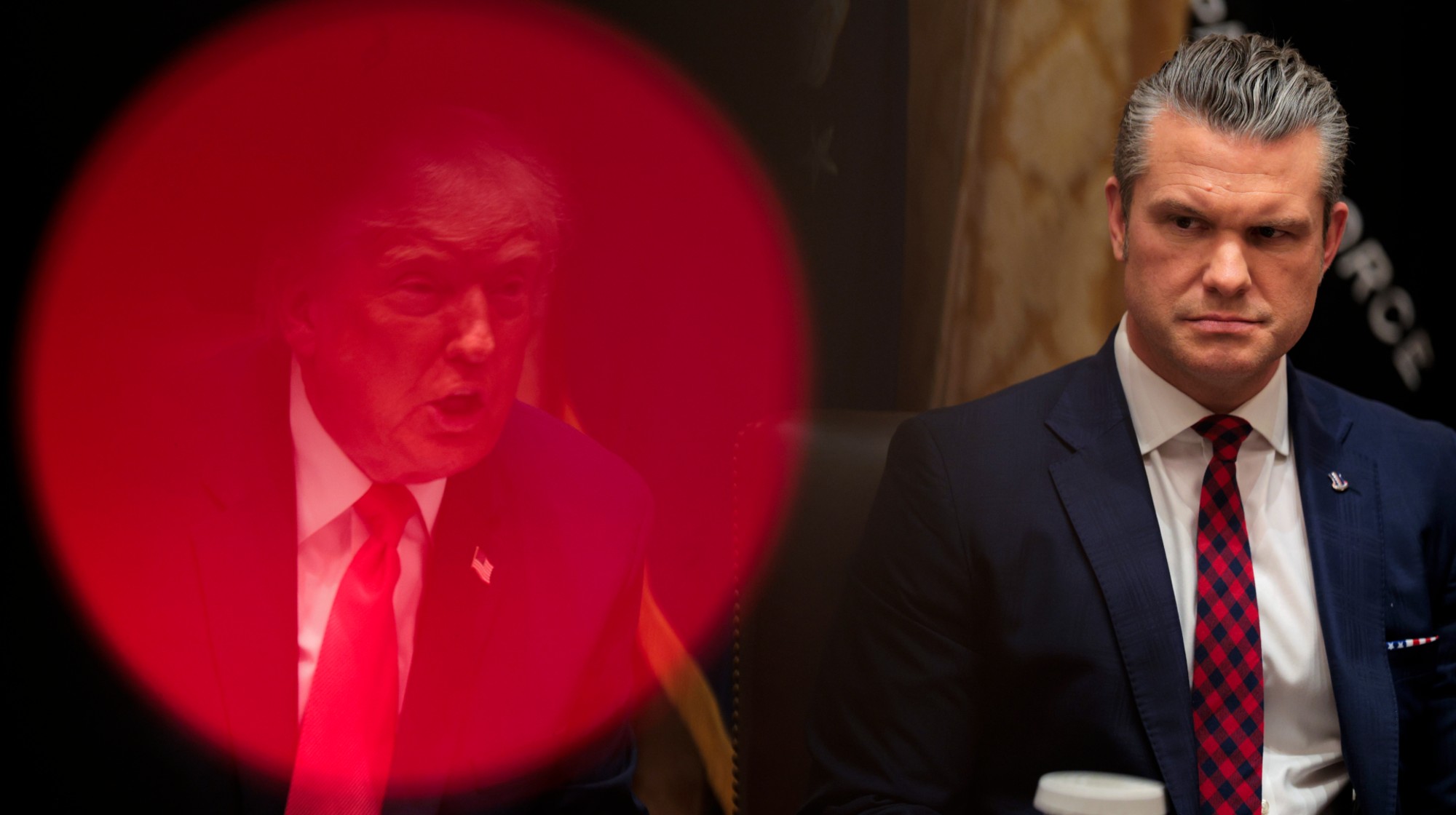How Rand Paul made Trump his BFF
The Senator from Kentucky wants to nurture the president's non-interventionist inclinations


Sen. Rand Paul's trip to Moscow this week amid heightened concerns about Russian interference in U.S. elections was one of the most audacious gambits of his political career. The Kentucky Republican's rivals in his own party are certain to accuse him of cozying up to Russian President Vladimir Putin, but the real objective of the trip was to get closer to President Trump.
Paul was practically the only major figure in Washington to defend Trump in the aftermath of his disastrous joint press conference with Putin, praising the president as a man of peace. "Trump Derangement Syndrome has officially come to the Senate," he said in response to new sanctions against Russia proposed in July. "The hatred for the president is so intense, that partisans would rather risk war than give diplomacy a chance."
Why is Paul hugging Trump so tightly? I can give you at least one reason: The president has loosened the grip of the party's almost uniformly hawkish foreign-policy elite. Paul is hoping that, by forging a relationship with Trump, he can give the president the confidence to heed his own — less interventionist — impulses rather than those of the hawks advising him.
The Week
Escape your echo chamber. Get the facts behind the news, plus analysis from multiple perspectives.

Sign up for The Week's Free Newsletters
From our morning news briefing to a weekly Good News Newsletter, get the best of The Week delivered directly to your inbox.
From our morning news briefing to a weekly Good News Newsletter, get the best of The Week delivered directly to your inbox.
This approach might be starting to pay off.
"While Trump tolerates his hawkish advisers ... he shares a real bond with Paul," Politico reported, quoting a White House aide as saying, "He actually at gut level has the same instincts as Rand Paul."
The paradox of Trump is that on the stump, he inveighs against nearly two decades of nation-building and fruitless wars, but in the Oval Office, he has mostly maintained the status quo. He has twice bombed Syria, continued American support for the catastrophic war in Yemen, and torn up the nuclear deal with Iran in a potential escalation of our conflict with the ayatollahs. He has drawn his national security team from the hawks and neoconservatives who largely populate the Republican foreign policy talent pool, allowing them to frequently override his instincts. He quarreled with — and ultimately gave in to — his generals and advisers when they resisted his demands to pull out of Syria. He acknowledged in his speech announcing an increase in troops in Afghanistan that his own inclination had been to withdraw from the 17-year-old war.
Yet Trump has also stopped short of calling for regime change in Syria. Politico reports this is also now his position on Iran. More importantly, Trump has balanced his "Little Rocket Man" taunts and all-caps tweets with a palpable desire to make diplomatic breakthroughs. He talked about meeting with Iran's leaders "without preconditions" and has already held a summit with North Korean leader Kim Jong Un. He stresses the importance of friendship with old adversaries at rallies.
A free daily email with the biggest news stories of the day – and the best features from TheWeek.com
Even if Trump's "Art of the Deal" mentality is wholly inadequate to accomplish what he's setting out to do on the world stage, politically getting Republicans to cheer talks with Russia, North Korea, and Iran — all things they jeered when former President Barack Obama or even Paul's father proposed them — has the potential to change the terms of the debate. Frequently dismissed as "isolationist," Trump has shown Republican war skeptics that it is possible, under the right circumstances, to isolate the neoconservatives.
But getting all buddy-buddy with Trump is no doubt risky for Paul. From the midterm elections to Special Counsel Robert Mueller's Russia investigation, there are many things that could discredit Trump and discourage others from attempting his brand of Republicanism. Alliances with Trump are often a one-way street. And at some point, it needs to become clear that making overtures to Trump are worth the cost of alienating some of the younger voters Paul's father's "liberty movement" uniquely reached. So far, Trump's concessions are nothing more than words.
One of Paul's closest allies on Capitol Hill, Congressman Justin Amash (R-Mich.), put it best: "Are we still droning people? Yeah," he told The Washington Post. "Are we still running covert operations that weren't authorized by Congress? Yeah. Is the government still spying on Americans without warrants? Without due process. Yeah. When some libertarians talk about the great accomplishments we're seeing on foreign policy, I don't know what they're talking about. Reaching out to these guys is one thing, but you have to move down the court. [Trump] actually made it harder for us to have a good relationship with Russia."
This is all true. But Trump has also appealed to a much wider swathe of the party than any libertarian or principled anti-war conservative ever has. Whatever doubts Trump privately entertains about endless war, it is good to have at least one public figure reinforcing them.
W. James Antle III is the politics editor of the Washington Examiner, the former editor of The American Conservative, and author of Devouring Freedom: Can Big Government Ever Be Stopped?.
-
 Why are micro-resolutions more likely to stick?
Why are micro-resolutions more likely to stick?In the Spotlight These smaller, achievable goals could be the key to building lasting habits
-
 What will happen in 2026? Predictions and events
What will happen in 2026? Predictions and eventsIn Depth The new year could bring peace in Ukraine or war in Venezuela, as Donald Trump prepares to host a highly politicised World Cup and Nasa returns to the Moon
-
 Why is Trump’s alleged strike on Venezuela shrouded in so much secrecy?
Why is Trump’s alleged strike on Venezuela shrouded in so much secrecy?TODAY'S BIG QUESTION Trump’s comments have raised more questions than answers about what his administration is doing in the Southern Hemisphere
-
 Bari Weiss’ ‘60 Minutes’ scandal is about more than one report
Bari Weiss’ ‘60 Minutes’ scandal is about more than one reportIN THE SPOTLIGHT By blocking an approved segment on a controversial prison holding US deportees in El Salvador, the editor-in-chief of CBS News has become the main story
-
 Has Zohran Mamdani shown the Democrats how to win again?
Has Zohran Mamdani shown the Democrats how to win again?Today’s Big Question New York City mayoral election touted as victory for left-wing populists but moderate centrist wins elsewhere present more complex path for Democratic Party
-
 Millions turn out for anti-Trump ‘No Kings’ rallies
Millions turn out for anti-Trump ‘No Kings’ ralliesSpeed Read An estimated 7 million people participated, 2 million more than at the first ‘No Kings’ protest in June
-
 Ghislaine Maxwell: angling for a Trump pardon
Ghislaine Maxwell: angling for a Trump pardonTalking Point Convicted sex trafficker's testimony could shed new light on president's links to Jeffrey Epstein
-
 The last words and final moments of 40 presidents
The last words and final moments of 40 presidentsThe Explainer Some are eloquent quotes worthy of the holders of the highest office in the nation, and others... aren't
-
 The JFK files: the truth at last?
The JFK files: the truth at last?In The Spotlight More than 64,000 previously classified documents relating the 1963 assassination of John F. Kennedy have been released by the Trump administration
-
 'Seriously, not literally': how should the world take Donald Trump?
'Seriously, not literally': how should the world take Donald Trump?Today's big question White House rhetoric and reality look likely to become increasingly blurred
-
 Will Trump's 'madman' strategy pay off?
Will Trump's 'madman' strategy pay off?Today's Big Question Incoming US president likes to seem unpredictable but, this time round, world leaders could be wise to his playbook
